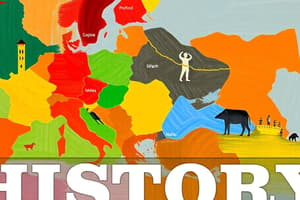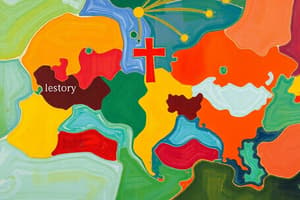Podcast
Questions and Answers
What is the definition of history?
What is the definition of history?
- The study of prehistoric artifacts and fossils.
- The exploration of cultures through modern perspectives.
- A chronological record of dates and events.
- Analysis of past events and their impacts on human affairs. (correct)
Which era includes the Stone Age, Bronze Age, and Iron Age?
Which era includes the Stone Age, Bronze Age, and Iron Age?
- Prehistoric Era (correct)
- Ancient History
- Classical Antiquity
- Medieval Period
What key development occurred during Classical Antiquity?
What key development occurred during Classical Antiquity?
- Political revolutions
- Feudalism
- Development of writing and trade (correct)
- Renaissance art and culture
What significant change characterized the Medieval Period?
What significant change characterized the Medieval Period?
What theme in history explores the organization of societies?
What theme in history explores the organization of societies?
Which type of source consists of original documents and firsthand accounts?
Which type of source consists of original documents and firsthand accounts?
Who is known as the 'Father of History'?
Who is known as the 'Father of History'?
What is a major benefit of studying history?
What is a major benefit of studying history?
Flashcards are hidden until you start studying
Study Notes
Key Concepts in History
- Definition of History: The study of past events, particularly in human affairs, including the analysis of causes, contexts, and impacts.
Key Periods in History
-
Prehistoric Era:
- Time before written records.
- Includes the Stone Age, Bronze Age, and Iron Age.
-
Ancient History:
- Involves early civilizations (e.g., Mesopotamia, Egypt, Indus Valley, China).
- Development of writing, trade, and governance.
-
Classical Antiquity:
- Greco-Roman period.
- Key developments in philosophy, politics (democracy, republics), and arts.
-
Medieval Period:
- Fall of the Western Roman Empire to the Renaissance.
- Feudalism, the spread of Christianity and Islam, and the rise of empires (e.g., Byzantine, Islamic Caliphates).
-
Renaissance:
- Rebirth of art, culture, and learning in Europe.
- Humanism and advancements in science and exploration.
-
Modern History:
- From the Age of Enlightenment to the present.
- Industrial Revolution, colonization, world wars, and the Cold War.
Important Themes in History
- Social Structures: How societies are organized (class systems, caste systems).
- Economic Systems: Development of trade, capitalism, socialism, and global economies.
- Political Systems: Evolution of governments, ideologies (democracy, totalitarianism), and political revolutions.
- Cultural Development: Influence of art, religion, language, and technology on societies.
- Conflict and Cooperation: Wars, treaties, and alliances shaping human interactions.
Historical Methods
- Primary Sources: Original documents, artifacts, and firsthand accounts.
- Secondary Sources: Analyses and interpretations of primary sources.
- Historiography: Study of how history is written and the differing perspectives applied.
Major Historians and Their Contributions
- Herodotus: Often called the "Father of History"; wrote "The Histories."
- Thucydides: Focused on political and military history; known for "The History of the Peloponnesian War."
- Karl Marx: Introduced historical materialism; emphasized class struggle in historical development.
- Fernand Braudel: Advocated for the study of long-term social history over events.
Importance of Studying History
- Understanding past events helps contextualize current issues.
- Provides insight into human behavior, cultures, and societies.
- Encourages critical thinking and analysis of sources and perspectives.
Key Concepts in History
- History encompasses the examination of past human events, focusing on causes, contexts, and consequences.
Key Periods in History
- Prehistoric Era: Characterized by a lack of written records, encompassing the Stone Age, Bronze Age, and Iron Age.
- Ancient History: Marked by the emergence of early civilizations such as Mesopotamia, Egypt, Indus Valley, and China, along with key innovations in writing, trade, and governance.
- Classical Antiquity: The Greco-Roman era noted for advancements in philosophy, the introduction of democratic and republican political systems, and significant contributions to the arts.
- Medieval Period: Spanning from the fall of the Western Roman Empire to the Renaissance, this era saw the rise of feudalism and the expansion of Christianity and Islam, alongside significant empires like the Byzantine and the Islamic Caliphates.
- Renaissance: A transformative period in Europe focused on the revival of art, culture, learning, humanism, and groundbreaking scientific advancements.
- Modern History: Encompasses the Age of Enlightenment to contemporary times, including the Industrial Revolution, waves of colonization, both World Wars, and the Cold War.
Important Themes in History
- Social Structures: Defined by the organization of societies through class and caste systems.
- Economic Systems: Evolution from traditional trade to modern capitalism, socialism, and the integration of global economies.
- Political Systems: Development and transformation of governance including democratic and totalitarian ideologies, alongside notable political revolutions.
- Cultural Development: Examination of how art, religion, language, and technology shape societies and identities.
- Conflict and Cooperation: The interplay of wars, treaties, and alliances that have influenced human relationships.
Historical Methods
- Primary Sources: Constitute original documents, artifacts, and firsthand accounts providing direct evidence of historical events.
- Secondary Sources: Comprised of scholarly analyses and interpretations that interpret primary sources.
- Historiography: The study of how history is recorded and the various perspectives and biases that influence historical writing.
Major Historians and Their Contributions
- Herodotus: Known as the "Father of History," he authored "The Histories," which chronicles the Greco-Persian Wars.
- Thucydides: His work "The History of the Peloponnesian War" focuses on political and military history with a critical approach to sources.
- Karl Marx: Proposed historical materialism, emphasizing the importance of class conflict as a driving force in historical development.
- Fernand Braudel: Pioneered the study of social history, advocating for long-term historical analysis over singular events.
Importance of Studying History
- Provides crucial context for understanding contemporary issues and challenges.
- Offers valuable insights into human behavior, various cultures, and social dynamics across time.
- Fosters critical thinking skills and the ability to analyze and interpret diverse historical narratives and sources.
Studying That Suits You
Use AI to generate personalized quizzes and flashcards to suit your learning preferences.




